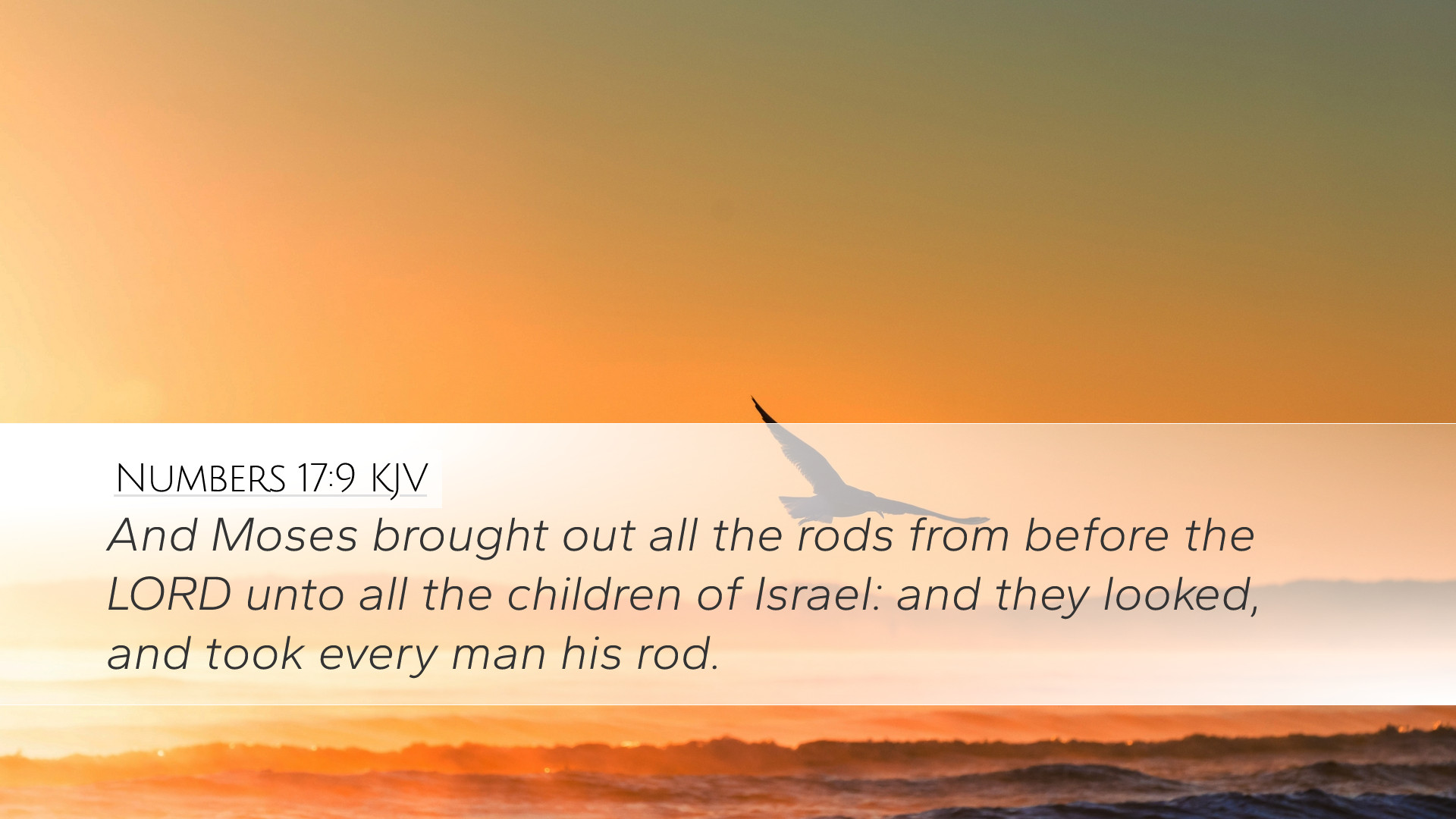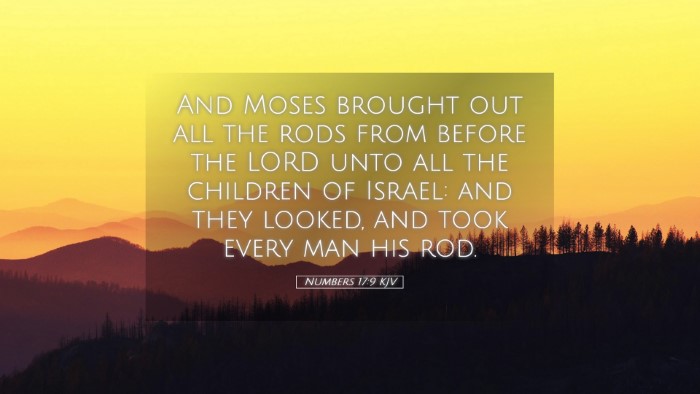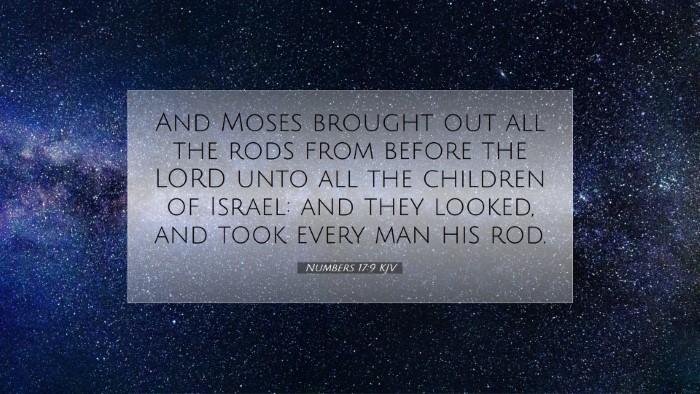Commentary on Numbers 17:9
Numbers 17:9 states: "And Moses brought out all the rods from before the Lord unto all the children of Israel: and they looked, and took every man his rod." This verse occurs in a fascinating segment representing God's authoritative endorsement of Aaron's priesthood and the choice of the Levitical priesthood over the other tribes of Israel. Below is a compilation of insights and reflections from esteemed public domain commentaries.
Introduction
This verse is pivotal as it draws attention to a significant act of divine selection and confirms Aaron's leadership role among the Israelites. This commentary synthesizes insights from renowned theologians like Matthew Henry, Albert Barnes, and Adam Clarke, who provide a rich theological understanding of this event.
The Context of Numbers 17
To appreciate the depth of verse 9, one must consider its surrounding context. The congregation had risen against the authority of Moses and Aaron, questioning their leadership. In response to this challenge, God instructs that each tribe provide a rod inscribed with the name of its representative leader. This act symbolizes divine decision-making in establishing His ordained leaders.
Historical Consideration
Matthew Henry emphasizes that this incident serves as a decisive intervention from God, reinforcing the notion that leadership is divinely appointed rather than politically arranged or democratically decided. The rods, representing the twelve tribes, serve as tokens of God's sovereign choice.
Insights from Commentaries
Matthew Henry’s Perspective
Matthew Henry points out that bringing out the rods signifies the confirmation of God's previous judgments and decisions. He notes:
- Visible Evidence: By displaying the rods, God provides visible evidence to quell dissent amongst His people.
- God's Authority: The act symbolizes the authority of God in leadership matters. As He chose Aaron, it is a confirmation that His choice cannot be overturned by human opinions.
- Community Response: The inspection of the rods by the Israelites provides a broader lesson on obedience and acceptance of divine will.
Albert Barnes’ Commentary
Albert Barnes elaborates on the significance of the rods as instruments of identification and affirmation, with several key takeaways:
- Affirmation of Leadership: Barnes argues that the act of displaying the rods affirms Aaron's unique vocation.
- Divine Justice: The Lord’s method of confirming Aaron's leadership underscores His justice, as it highlights His desire for order and authority within the community.
- Symbol of Unity: The rods collectively represent unity under God's chosen leader, encouraging the Israelites to look to the divine will for guidance and direction.
Adam Clarke’s Insights
Adam Clarke offers a more pastoral view on this scripture, emphasizing the implications for faith and leadership.
- Trust in Divine Choice: Clarke emphasizes the necessity for believers to trust in God’s choice of leaders, as His decisions are sovereign and purposeful.
- Importance of Obedience: He also notes the role of obedience in recognizing and submitting to divine authority.
- Encouragement for Leaders: The exodus of the rods reminds leaders of their accountability to God and the community they serve.
Theological Reflections
This verse presents various theological reflections befitting students and theologians:
- Divine Sovereignty: The narrative illustrates the overarching theme of divine sovereignty in the selection of leaders and spiritual authority.
- Faith Community Dynamics: The response of the Israelites to Moses’ action illustrates the importance of community dynamics in faith practices.
- Leadership and Accountability: The reminder that spiritual leaders operate under divine scrutiny serves as a caution and encouragement.
- Symbolism of the Rod: The rod might also symbolize the authority given to spiritual leaders and their role in shepherding the community.
Practical Applications
For pastors, students, and scholars, this verse and its commentary offer valuable teachings applicable to contemporary church leadership:
- Recognition of Authority: Understanding that leadership is divinely ordained assists in fostering respect and healthy dynamics within congregations.
- Importance of Transparency: The communal viewing of the rods emphasizes the need for transparency in leadership processes.
- Unity under Leadership: It serves as a reminder that healthy church leadership should foster unity and collaboration, underpinned by a shared commitment to God’s will.
Conclusion
In summation, Numbers 17:9 is rich with insights regarding divine selection, authority in leadership, and community dynamics. The commentaries by Henry, Barnes, and Clarke bridge historical narratives with valuable lessons for today’s church, encouraging humility, obedience, and reverence toward the God-appointed authorities within the faith community. Such reflections serve as foundations for understanding the broader implications of leadership within the context of divine governance.


